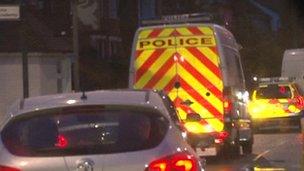Kent food workers held in 'slave-like' conditions
- Published
Two people were arrested in the dawn raid in Maidstone
Two people have been arrested after an investigation into the alleged "slave-like" exploitation of Lithuanian men.
A man, aged 52, and woman, 50, were held on suspicion of human trafficking for labour exploitation following a dawn raid by Kent Police in Maidstone.
It is claimed the men were threatened with violence and forced to live in squalid conditions while working as chicken catchers for the food industry.
Police say a total of 32 workers could be at risk from exploitation.
Friday morning's raid on the offices of a licensed gangmaster followed a multi-agency investigation.
'Use of violence'
Liam Vernon, from the UK Human Trafficking Centre (UKHTC) at the Serious Organised Crime Agency (Soca), said: "We suspect the people arrested today were involved in the trafficking of Lithuanian men into the United Kingdom for exploitation within the food industry.
"It's alleged that the men, who will now receive specialist care and support from Soca's vulnerable persons team and the Salvation Army, were subjected to slave-like conditions and controlled through the use of violence."

The early morning arrests on Friday followed a raid on the offices of a licensed gangmaster
Chicken catchers are employed to grab several of the animals at a time and take them to their desired destination, as they cannot be herded.
Det Insp Keith Roberts said the migrant workers were reportedly forced to work in an environment giving little or no regard to their safety or well-being.
The men also spent hours being transported around the country in minibuses without pay, it is further alleged.
The Gangmasters' Licensing Authority (GLA) said it was determined to drive out those who abused and exploited vulnerable workers.
Chief executive Ian Livsey said: "There is no hiding place for those who exploit the vulnerable, and neither we nor our partner law enforcement agencies will tolerate abuse of the vulnerable worker."
- Published15 May 2012
- Published29 February 2012
- Published1 November 2010